Feeding raw meat to dogs is a topic that sparks much debate among pet owners and experts. Many dog owners wonder if it’s safe to give their dogs raw meat from the supermarket. In this article, I will explore the benefits and risks of feeding dogs raw meat, specifically from the supermarket, and provide guidance based on expert opinions and veterinary advice.
Feeding dogs a raw meat diet has gained popularity in recent years. Proponents of this diet argue that it aligns with a dog’s biological needs as carnivores and promotes better overall health. Raw meat diets are often praised for their potential benefits, such as a healthier coat and skin, improved breath and oral health, potential improvement in medical conditions, improved digestion, and maintenance of lean mass and healthy weight.
However, it is important to consider the risks associated with feeding dogs raw meat, especially when sourced from the supermarket. The presence of harmful bacteria and pathogens, such as salmonella, listeria, campylobacter, clostridium, E. coli, and trichinosis, pose a potential threat to both dogs and humans. Additionally, dogs’ nutritional needs have evolved from their wild ancestors, and a raw meat diet may lead to nutritional deficiencies.
Key Takeaways:
- Feeding dogs raw meat from the supermarket has both benefits and risks.
- Potential benefits include a healthier coat, improved breath and oral health, and potential improvement in medical conditions.
- Risks of feeding dogs raw meat include bacterial contamination and possible nutritional deficiencies.
- Proper handling and hygiene practices can reduce the risk of bacterial contamination.
- Consulting with a veterinarian is essential to ensure your dog’s unique dietary needs are met.
Possible benefits of raw meat for dogs
Feeding dogs raw meat from a supermarket can offer numerous benefits that align with their biological needs. Many dog owners opt for the Biologically Appropriate Raw Food (BARF) diet, which includes uncooked meat, offal, vegetables, fruits, and eggs. This diet emphasizes the natural food sources that dogs would consume in the wild.
Advocates of the raw meat diet argue that dogs are omnivores with digestive systems designed for raw meat digestion. Their shorter gastrointestinal systems and stronger stomach acids are better equipped to break down and absorb nutrients from raw meat compared to processed or cooked foods.
Some key benefits of feeding raw meat to dogs include:
- A healthier coat and skin: Raw meat contains essential fatty acids and nutrients that promote a shiny coat and improve skin health.
- Improved breath and oral health: Chewing on raw meat can help remove plaque and tartar buildup, leading to fresher breath and better oral hygiene.
- Possible improvement in medical conditions: Some dog owners report improvements in allergies, joint issues, and digestive problems after switching to a raw meat diet, although further research is needed to confirm these claims.
- Improved digestion: Raw meat is easier for dogs to digest, as it closely resembles their natural diet.
- Maintenance of lean mass and healthy weight: Raw meat provides a source of high-quality protein, which helps dogs maintain lean muscle mass and a healthy weight.
It’s important to note that while raw meat can have potential benefits, it’s crucial to consult with a veterinarian to ensure your dog’s specific needs are met. A balanced and nutritionally complete raw diet should include a variety of ingredients to ensure all essential nutrients are present.
Expert Quote:
“Feeding dogs a raw meat diet can provide a range of benefits for their overall health. It’s a biologically appropriate choice that supports their natural digestive and nutritional needs. However, it’s crucial to work closely with a veterinarian to ensure the diet is properly balanced and meets your dog’s requirements.” – Dr. Olivia Anderson, DVM
Potential risks of a raw meat dog diet
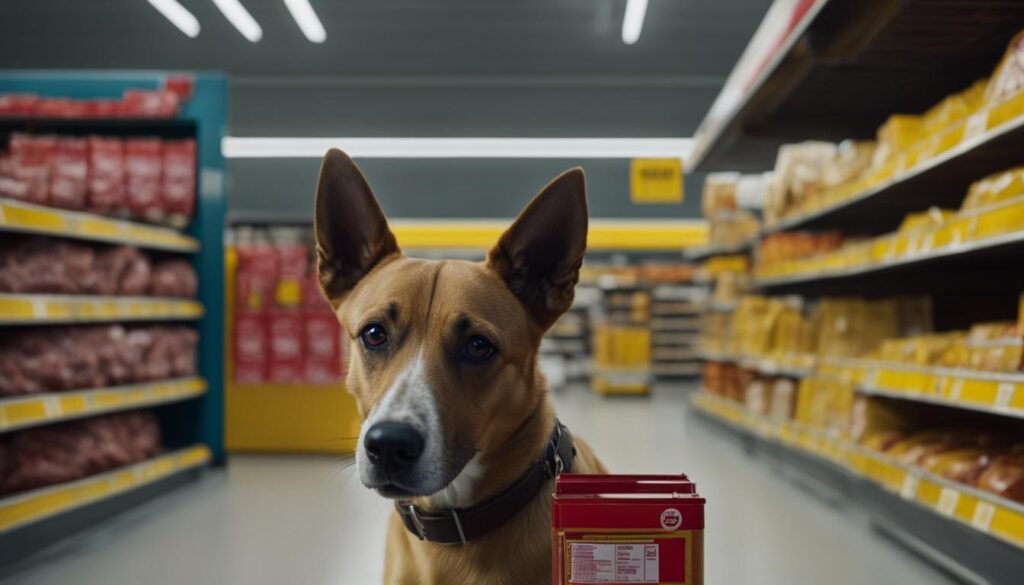
Feeding dogs raw meat from a supermarket comes with potential risks that need to be considered. While there are benefits to a raw meat diet, it’s important to be aware of the risks involved to ensure the health and well-being of your furry friend.
- Increased risk of contamination: Raw dog food has a higher risk of contamination compared to cooked meat because heat destroys pathogens in cooked meat. This increased risk of contamination can expose your dog to harmful bacteria present in raw meat.
- Harmful bacteria in raw dog food: Raw meat can be contaminated with various harmful bacteria, including salmonella, listeria, campylobacter, clostridium, E. coli, and trichinosis. These bacteria can cause serious illnesses in dogs when consumed.
- Potential pathogens in raw meat: Raw meat may contain pathogens that can pose health risks to your dog. These pathogens can lead to infections, gastrointestinal issues, and other health complications.
- Nutritional deficiencies: Dogs’ nutritional needs have evolved from their wild ancestors, and their digestive systems are adapted to process certain types of food. Feeding them a raw meat diet may result in nutritional imbalances and deficiencies if not properly planned and executed.
- Dogs’ evolved digestive system: Dogs have a shorter digestive tract and stronger stomach acids that were developed to digest raw meat. However, this does not mean that all dogs can handle a raw meat diet without experiencing digestive issues.
- Food intolerances and allergies: Just like humans, dogs can develop food intolerances and allergies. Feeding them a raw meat diet may exacerbate these conditions or even trigger new allergies, leading to discomfort and potential health problems.
- Lack of regulation in raw meat diets: The raw meat diet industry is not tightly regulated, which means that quality control and sourcing may vary. This lack of regulation raises concerns about the safety and balance of nutritional content in commercial raw meat diets.
It is crucial to carefully evaluate these risks before deciding to feed your dog a raw meat diet. Consulting with a veterinarian can provide you with personalized guidance based on your dog’s specific needs and health conditions.
How to Reduce the Risk of Feeding Dogs Raw Meat
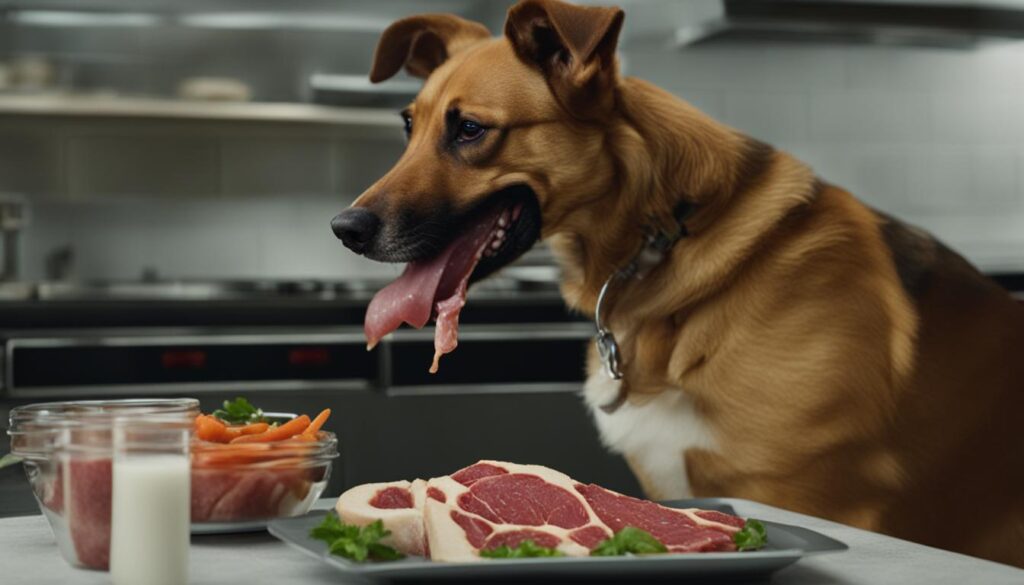
When it comes to feeding dogs raw meat from the supermarket, it’s important to take certain precautions to ensure the safety and well-being of your furry friend. By implementing proper handling and cleaning procedures and following hygiene guidelines, you can minimize the potential risks associated with feeding raw meat to dogs.
Quality and Hygiene of Raw Meat
Start by selecting high-quality raw meat for your dog. Choose fresh meat and avoid purchasing meat that has been sitting out for too long or shows signs of spoilage. By opting for fresh meat, you can reduce the risk of bacterial contamination and ensure that your dog receives the necessary nutrients from their raw diet.
Proper Handling and Cleaning Procedures
Proper handling and cleaning procedures are essential to prevent cross-contamination and maintain hygiene while preparing raw meat for your dog. Consider the following tips:
- Freeze raw meat until ready for use to minimize bacterial growth.
- Keep raw meat separate from other food in order to avoid contamination.
- Clean preparation surfaces and food bowls thoroughly after each use to remove any remaining bacteria.
- Wash your hands before and after handling raw meat to prevent the spread of harmful bacteria.
Caution with Feeding Raw Bones
While raw bones can be a natural and enjoyable treat for dogs, it’s important to exercise caution. Choose bones that are appropriate for your dog’s size and breed to prevent choking hazards. Supervise your dog while they enjoy their bone, as excessive chewing can lead to dental injuries or gastrointestinal issues.
Vulnerability of Puppies and Senior Dogs
Puppies and senior dogs have specific nutritional needs and may be more vulnerable to potential risks associated with raw meat. Consult with your veterinarian to ensure that their raw diet is balanced and meets their age-specific requirements. Additionally, monitor their health closely and seek veterinary advice if any concerning symptoms arise.
Balanced Nutrition in a Raw Diet
Providing a balanced and nutritious raw diet is essential for your dog’s overall health and well-being. Ensure that your dog’s raw meat diet incorporates a variety of meats, organs, bones, and other essential nutrients to meet their dietary needs. If you’re unsure about proper nutrition or need assistance in creating a balanced raw diet, consult with a qualified veterinarian or veterinary nutritionist.
By following these guidelines, you can significantly reduce the risk of feeding raw meat to your dogs, ensuring their safety and promoting their optimal health. Remember to prioritize quality, hygiene, and balance in your dog’s raw diet, and consult with a veterinarian for personalized guidance.
What if my dog ate raw meat?
If your dog has consumed raw meat from the supermarket, it’s important to be aware of potential concerns. While most dogs will be fine after consuming raw meat, it’s advisable to monitor them for any unusual symptoms. If you have concerns or notice any changes in behavior or health, contact your veterinarian for guidance and advice. In cases where severe illness occurs, particularly overnight or on weekends, seeking assistance from an emergency animal hospital may be necessary.
Are other raw foods safe for dogs?

In addition to raw meat, dogs can safely consume other raw foods as part of a balanced diet. Raw eggs, fruits, and vegetables can be beneficial additions to their meals. However, it’s crucial to ensure proper preparation and moderation to maintain their well-being.
Raw eggs, while a good source of protein and essential fatty acids, should be fed with caution due to the risk of salmonella contamination. It’s recommended to serve eggs cooked or consult with your veterinarian for guidance.
Fruits and vegetables, when properly washed and prepared, can provide dogs with essential vitamins, minerals, and fiber. However, it’s important to remove any potentially harmful parts, such as seeds, pits, or toxic plants. Moreover, some fruits and vegetables, like grapes and onions, can be toxic to dogs and should be avoided entirely.
The Benefits of Raw Eggs for Dogs
Raw eggs are a great source of protein and contain essential fatty acids, which benefit your dog’s skin and coat health. Additionally, eggs are a good source of vitamin D and vitamin A, providing added nutrition to their diet. However, raw eggs may carry a risk of salmonella contamination, so it’s important to practice caution and seek advice from your veterinarian before adding this food to your dog’s meal plan.
The Benefits of Raw Fruits and Vegetables for Dogs
Raw fruits and vegetables, when included in a dog’s diet, can offer a range of benefits. They provide vitamins, minerals, and fiber that promote overall health and digestion. For example, carrots are an excellent source of beta-carotene, which supports eye health, while blueberries are rich in antioxidants that help boost the immune system. However, it’s essential to wash all fruits and vegetables thoroughly to remove any pesticides or potential contaminants.
Remember that every dog is unique, and their dietary needs may vary. Consult with your veterinarian to determine the appropriate portion sizes and types of raw foods that are safe and beneficial for your dog.
| Safe Raw Foods for Dogs | Potential Benefits |
|---|---|
| Raw eggs | – Protein and essential fatty acids for skin and coat health – Vitamin D and vitamin A for added nutrition |
| Raw fruits and vegetables | – Vitamins, minerals, and fiber for overall health and digestion – Antioxidants for immune system support |
Key Takeaways
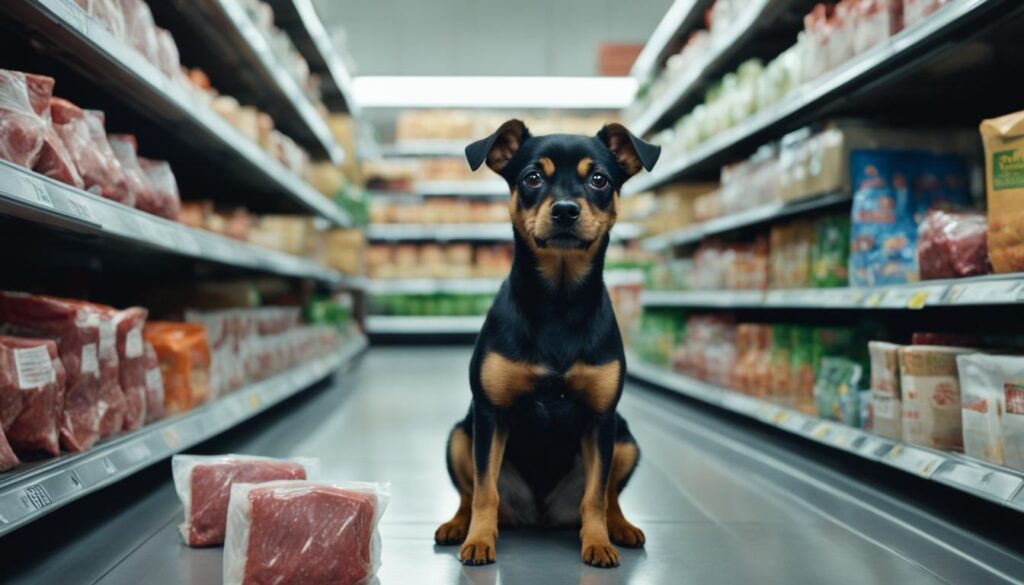
Feeding dogs raw meat from the supermarket can have both benefits and risks. It is important to carefully consider these factors before incorporating raw meat into your dog’s diet.
Benefits of Feeding Dogs Raw Meat from the Supermarket
- A potential benefit of feeding raw meat is the potential for a healthier coat and improved oral health for your dog.
- Raw meat may also have the potential to improve certain medical conditions, promote better digestion, and help your dog maintain a lean physique and healthy weight.
Risks of Feeding Dogs Raw Meat from the Supermarket
- Raw meat from the supermarket carries the risk of bacterial contamination and may contain harmful pathogens such as salmonella, listeria, campylobacter, clostridium, E. coli, and trichinosis.
- Additionally, feeding dogs a raw meat diet without proper nutritional balance can lead to nutritional deficiencies and imbalances.
Reducing Risk through Proper Handling and Hygiene
To reduce the risk of feeding your dog raw meat from the supermarket:
- Choose fresh meat and avoid meat that has been sitting out for too long.
- Practice proper handling and cleaning procedures, including freezing raw meat until ready for use, keeping raw meat separate from other food, cleaning preparation surfaces and food bowls, and washing hands before and after handling raw meat.
- Exercise caution when feeding your dog raw bones, ensuring they are large enough to prevent choking hazards.
Monitoring for Any Concerning Symptoms
It is important to closely monitor your dog for any concerning symptoms after consuming raw meat from the supermarket. If you notice any unusual changes in behavior or health, consult with your veterinarian for guidance and advice.
Consultation with a Veterinarian
Consulting with a veterinarian is crucial when feeding raw meat to your dog. A veterinarian can provide guidance on balanced nutrition, address any specific health concerns, and help tailor a raw diet that meets your dog’s individual needs.
Balanced Nutrition in a Raw Diet
Providing balanced nutrition is essential for your dog’s overall health and well-being. Consulting with a veterinarian can help ensure that your dog’s raw diet contains all the necessary nutrients and meets their unique dietary requirements.
Pro Tip: Consider Pet Insurance
When it comes to protecting your dog and safeguarding their well-being, pet insurance is a wise consideration. Accidents and illnesses can happen unexpectedly, and the resulting veterinary bills can be a significant financial burden. With pet insurance, you can have peace of mind knowing that your dog’s health is protected and that you won’t have to worry about the high costs of medical treatments.
Pet insurance provides coverage for a range of potential expenses, including vet bills for accidents, illnesses, and specialized treatments. Whether your dog needs emergency surgery or ongoing treatment for a chronic condition, pet insurance can help alleviate the financial strain.
By investing in pet insurance, you’re ensuring that your furry companion receives the necessary medical care without any financial stress. It allows you to focus on your dog’s health and well-being, knowing that you can provide them with the best possible care.
When selecting a pet insurance plan, make sure to read and understand the terms, coverage options, and any exclusions. Consider factors such as breed-specific health risks, pre-existing conditions, and the level of coverage that suits your budget and needs. Comparing different insurance providers and their policies can help you find the best option for your dog.
Remember, accidents or illnesses can happen at any time, and having pet insurance can make a significant difference in your dog’s life. Protect your furry friend and your peace of mind by considering pet insurance today.
The Benefits of Pet Insurance:
- Financial protection from unexpected vet bills
- Peace of mind knowing your dog’s health is covered
- Access to specialized treatments and procedures
- Ability to provide the best care without financial stress
- Options for customizable coverage based on your dog’s needs
Having pet insurance means you can prioritize your dog’s health and well-being with confidence, knowing that you have the support to manage unexpected veterinary expenses.
Pet Insurance Providers Comparison
| Insurance Provider | Monthly Premium | Deductible | Coverage Limit | Additional Benefits |
|---|---|---|---|---|
| ABC Pet Insurance | $30 | $250 | $10,000 per year | Wellness package included |
| XYZ Pet Insurance | $40 | $200 | Unlimited | Behavioral therapy coverage |
| 123 Pet Insurance | $25 | $300 | $5,000 per year | Alternative therapy coverage |
Table: A comparison of pet insurance providers, their monthly premiums, deductibles, coverage limits, and additional benefits. These factors can help you make an informed decision when choosing the right insurance provider for your dog.
Can I Feed My Dog Raw Meat From The Supermarket – Wrapping Up
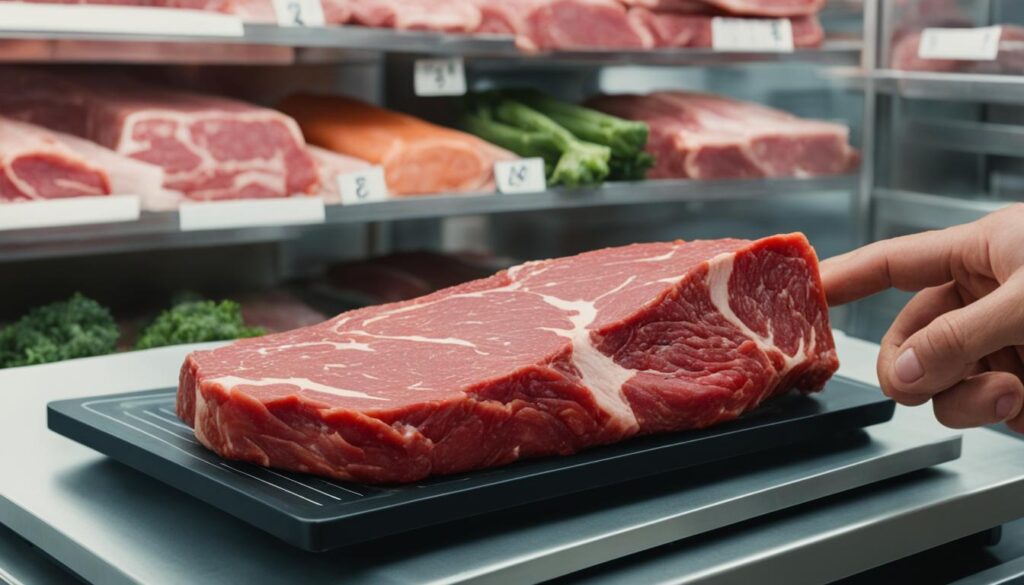
In conclusion, when deciding whether to feed your dog raw meat from the supermarket, it is important to weigh the potential benefits and risks. While there are potential benefits, such as a healthier coat and improved oral health, it is crucial to consider the risks associated with bacterial contamination and nutritional deficiencies.
Consulting with a veterinarian is essential to ensure that your dog’s unique dietary needs are met and to address any potential health risks. A veterinarian can provide guidance and recommendations on the appropriate raw meat diet and help ensure balanced nutrition for your pet. They can also advise on proper handling and storage practices to reduce the risk of bacterial contamination.
Remember, providing a balanced and nutritious diet is key to the overall health and well-being of your dog. While raw meat from the supermarket can be an option, it is important to consult with a veterinarian to make an informed decision that best meets your dog’s individual needs.
| Pros of Feeding Dogs Raw Meat from the Supermarket | Cons of Feeding Dogs Raw Meat from the Supermarket |
|---|---|
|
|
Visual representation of weighing the benefits and risks when feeding dogs raw meat from the supermarket.
FAQ: Can I Feed My Dog Raw Meat From The Supermarket?
In this section, I’ll address some frequently asked questions about feeding dogs raw meat from the supermarket.
Can I feed my dog raw meat from the supermarket?
Feeding your dog raw meat from the supermarket is a personal choice that comes with both benefits and risks. While some dog owners believe in the potential health advantages, it’s essential to consider the potential risks and consult with a veterinarian.
What are the risks and benefits of feeding dogs raw meat?
Feeding dogs raw meat can provide potential benefits such as a healthier coat, improved oral health, and potential improvement in medical conditions. However, it also carries risks, including bacterial contamination and potential nutritional deficiencies. Consulting with a veterinarian can help you make an informed decision for your dog’s unique needs.
Is supermarket raw meat safe for my dog?
Supermarket raw meat may contain harmful bacteria and pathogens that can be dangerous to dogs and humans. It’s crucial to handle and prepare raw meat properly to minimize the risk of contamination. Freezing raw meat, keeping it separate from other food, and maintaining proper hygiene can help reduce the chances of illness.
Should I consult a veterinarian before feeding my dog raw meat?
Consulting a veterinarian is highly recommended before introducing raw meat into your dog’s diet. They can assess your dog’s overall health, dietary requirements, and help guide you on the best approach, taking into account any specific health conditions or concerns.
What should I do if my dog has consumed raw meat?
If your dog has consumed raw meat from the supermarket and you’re concerned about potential health risks, it’s important to monitor them for any unusual symptoms. If you notice any changes in behavior or health, contact your veterinarian for guidance and advice.
Are there any alternatives to feeding dogs raw meat from the supermarket?
Yes, there are alternative options to feeding dogs raw meat from the supermarket. Commercially available raw food diets, formulated specifically for dogs, can be an alternative to supermarket raw meat. These diets undergo processing and testing to minimize the risk of bacterial contamination and help ensure balanced nutrition for your dog.
Additional Resources for Feeding Dogs Raw Meat from the Supermarket
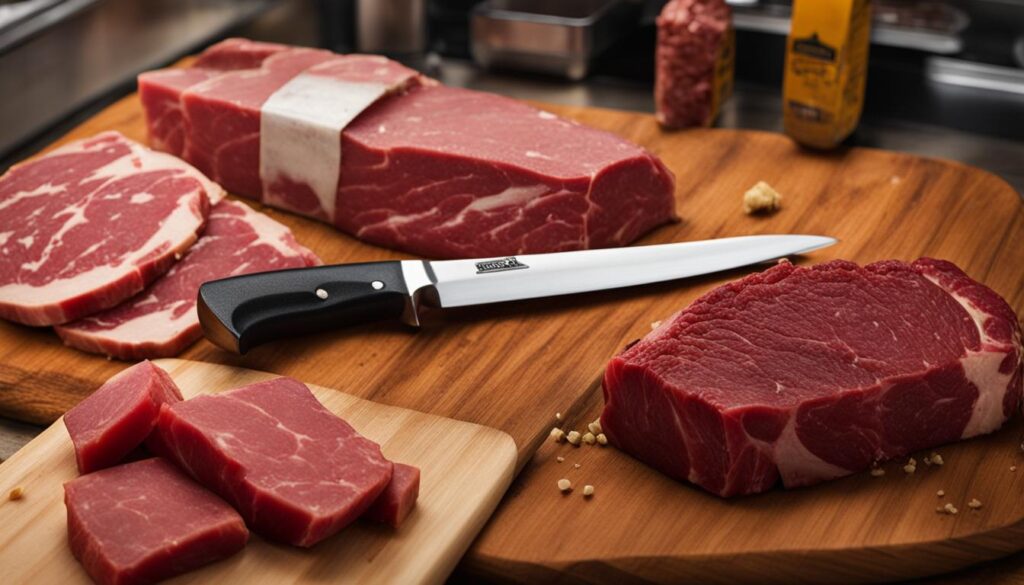
For additional information and resources on feeding dogs raw meat from the supermarket, I highly recommend consulting with a veterinarian who specializes in raw meat diets for dogs. They possess the expertise to provide personalized guidance and recommendations for balanced nutrition based on your dog’s unique needs and health conditions.
When it comes to feeding your dog a raw meat diet, seeking professional advice is crucial to ensure they are receiving the necessary nutrients for optimal health. A veterinarian can help you navigate the potential risks and benefits associated with raw meat diets and provide guidance on how to achieve a balanced and nutritious diet for your canine companion.
Here are some additional resources you can explore:
- American Veterinary Medical Association (AVMA): Find a Veterinarian
- ASPCA: Our Vet Experts Advocate for a Raw Diet for Dogs
- American Kennel Club (AKC): Your Puppy’s Vet Checkup Guide
- Centers for Disease Control and Prevention (CDC): Healthy Pets, Healthy People – Dogs
Remember, consulting with a veterinarian will ensure you make informed decisions regarding your dog’s diet and overall wellness. They will provide valuable insights and guidance to help you provide the best care for your furry friend.
| Resource | Description |
|---|---|
| American Veterinary Medical Association (AVMA): Find a Veterinarian | Use the AVMA’s search tool to find a veterinarian near you who can provide guidance on raw meat diets for dogs. |
| ASPCA: Our Vet Experts Advocate for a Raw Diet for Dogs | Read expert insights from the ASPCA on the benefits and considerations of feeding dogs a raw meat diet. |
| American Kennel Club (AKC): Your Puppy’s Vet Checkup Guide | Discover the AKC’s comprehensive guide to your puppy’s initial vet checkup, including dietary advice. |
| Centers for Disease Control and Prevention (CDC): Healthy Pets, Healthy People – Dogs | Learn about preventive measures to keep both your dog and your family safe when handling raw meat. |
Wrapping Up
In conclusion, feeding dogs raw meat from the supermarket can offer potential benefits but also comes with inherent risks. While raw meat can contribute to a healthier coat, improved oral health, and other positive effects, it is important to weigh these benefits against the potential dangers. Bacterial contamination and nutritional deficiencies are concerns that should not be overlooked.
Consulting with a veterinarian is vital in order to ensure that your dog’s specific dietary needs are met and any potential health risks are addressed. A qualified professional can provide personalized guidance and recommendations for a balanced and nutritious diet that takes into account your dog’s individual requirements and overall well-being.
Ultimately, providing a well-rounded and complete nutrition plan is key to keeping your dog healthy and happy. While raw meat may play a role in their diet, it should be given careful consideration alongside other important factors such as age, breed, size, and medical conditions. By striking a balance and consulting with the appropriate experts, you can make informed decisions about feeding your dog raw meat from the supermarket and ensure their nutritional needs are met.
FAQ
Is it safe to give my dog supermarket raw meat?
Feeding dogs raw meat from the supermarket carries potential risks. While some dog owners opt for a raw meat diet, it’s important to consider the potential dangers such as bacterial contamination and nutritional deficiencies. Consulting with a veterinarian is crucial to ensure your dog’s unique dietary needs are met and any potential health risks are addressed.
What are the possible benefits of raw meat for dogs?
Feeding dogs a raw meat diet, such as the BARF diet, can have potential benefits, including a healthier coat and skin, improved breath and oral health, potential improvement in medical conditions, improved digestion, and maintenance of lean mass and healthy weight.
What are the potential risks of a raw meat dog diet?
There are several potential risks associated with feeding dogs raw meat from the supermarket, including an increased risk of contamination compared to cooked meat, the presence of harmful bacteria and pathogens in raw dog food, potential nutritional deficiencies, and the lack of regulation in raw meat diets.
How can I reduce the risk of feeding dogs raw meat?
To reduce the risk of feeding dogs raw meat, it’s important to consider the quality and hygiene of the raw meat you purchase. Follow proper handling and cleaning procedures, freeze raw meat until ready for use, keep raw meat separate from other food, clean preparation surfaces and food bowls, wash hands before and after handling raw meat, exercise caution when feeding raw bones, and be mindful of the dietary needs of puppies and senior dogs.
What should I do if my dog has consumed raw meat?
If your dog has consumed raw meat from the supermarket, monitor them for any unusual symptoms. If you have concerns or notice any changes in behavior or health, contact your veterinarian for guidance and advice. In cases of severe illness, especially outside of regular veterinary hours, consider seeking assistance from an emergency animal hospital.
Are other raw foods safe for dogs?
Raw eggs, fruits, and vegetables can be safe for dogs when included in a balanced diet. However, caution should be exercised, as raw eggs can carry the risk of salmonella, and fruits and vegetables should be thoroughly washed to remove any potential contaminants.
What are the key takeaways from feeding dogs raw meat from the supermarket?
Feeding dogs raw meat from the supermarket has both benefits and risks. To minimize the risk, proper handling and hygiene practices should be followed, dogs should be monitored for any concerning symptoms, and consultation with a veterinarian is important to provide balanced nutrition and address any health concerns.
Should I consider pet insurance when feeding my dog raw meat?
Considering pet insurance can help protect your dog’s health and your finances in case of accidents or illnesses. Veterinary bills can be costly, and having pet insurance ensures that your dog receives necessary medical care without financial stress.






